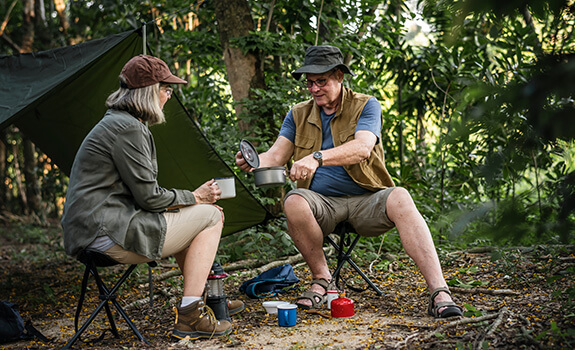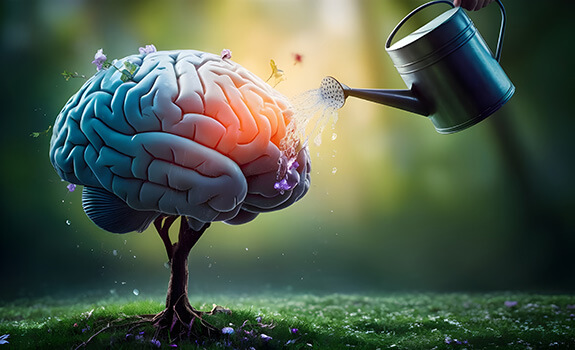From Ram Rao
Ph.D., Principal Research Scientist
February 18, 2026•From Ram Rao, Insider Strategies, News
The Science of Forest Air: Ancient Traditions Protect the Modern Brain
Ancient traditions like India’s Van Bhojan and Japan’s Shinrin-yoku have long celebrated the healing power of forests. In his blog “The Science of Forest Air,” Dr. Rao discusses how modern research now reveals that trees release powerful aromatic compounds that reduce stress, inflammation, and improve immune and cognitive function. Time spent in nature acts as a multi-system reset, offering a simple yet powerful strategy to support brain health and resilience. Read More »
January 15, 2026•Behavior Change, From Ram Rao, Insider Strategies, News
Sleep Deprivation: New Insights about The Brain’s Hidden Cleaning Crisis
In his blog, Sleep Deprivation: New Insights about The Brain’s Hidden Cleaning Crisis, Dr. Rao highlights a recent groundbreaking study connecting sleep, the glymphatic system, Alzheimer’s risk, and long-term brain health. The findings underscore an urgent truth: the brain will clean itself one way or another. The question is whether we allow that cleaning process to happen efficiently at night or pay the price through daytime cognitive breakdown. Read More »
December 12, 2025•From Ram Rao, Insider Strategies, News
Nourishing the Brain: The Healing Power of Connection
Social connectivity is a powerful ally for brain health. In his blog “Nourishing the Brain: The Healing Power of Connection”, Dr. Ram Rao discusses how meaningful relationships and social connections help build cognitive reserve and lower the risk of dementia. Conversation, laughter, and shared activities stimulate multiple brain regions, enhancing mood, cognition, and resilience, thereby boosting both emotional well-being and neurological vitality. Read More »
November 17, 2025•From Ram Rao, Insider Strategies, News
Falling Back: Supporting Mood and Memory Through Shorter Days
As daylight hours shrink and we fall back one hour, there may be subtle shifts in mood, energy, and focus, especially among individuals living with Alzheimer’s or cognitive decline. In his blog, Falling Back: Supporting Mood and Memory Through Shorter Days, Dr. Rao explains how light, movement, and routine play a vital role in maintaining mood and cognitive stability during the darker months. With small adjustments, the season can remain one of warmth, connection, and vitality for both participants and caregivers. Read More »
October 17, 2025•From Ram Rao, Insider Strategies, News
A Mindful Kitchen: Where Hygiene Meets Harmony
A toxin-free kitchen is also about what we bring into the space and how the environment in the kitchen makes us feel. Following Julie’s inspiring piece on creating a toxin-free kitchen, Dr. Rao offers further ideas in his blog to help turn the kitchen into a space of healing and joy. From leaving footwear at the door to inviting nature indoors, small mindful practices can transform the kitchen into a healing and joyful sanctuary. Read More »
September 18, 2025•From Ram Rao, News
The Nose Knows: Loss of Smell Could Be The First Alarm Bell for Alzheimer’s Disease
In his blog, Dr. Rao describes results from a recent study that show that changes in nerve-cell membranes alert immune cells to dismantle olfactory connections, resulting in loss of smell sensations long before memory systems begin to decline. The study offers a promising avenue for earlier diagnosis and intervention. Read More »
August 14, 2025•From Ram Rao, Insider Strategies, News
Dehydration: Effects on the Brain and Cognition
Dehydration, even at mild to moderate levels, impairs cognitive function, mood, and neurological efficiency. In his blog, Dehydration: Effects on the Brain and Cognition, Dr Rao summarizes current evidence linking hydration status to brain health and mechanisms of cognitive decline, populations at risk, and preventive strategies. Read More »
July 16, 2025•From Ram Rao, Insider Strategies, News
Birdsong and Nature Walks: A Gentle Path to Mental Clarity and Cognitive Wellness
Birdsong and nature walks serve as powerful tools to enhance mental clarity, reduce stress, and support cognitive health, especially in older adults. In his blog, Birdsong and Nature Walks: A Gentle Path to Mental Clarity and Cognitive Wellness, Dr. Rao explains why listening to birds can improve mood and well-being for hours, functioning like yoga for the brain. Combined with gentle movement outdoors, this practice fosters mindfulness, emotional balance, and brain resilience. Read More »









